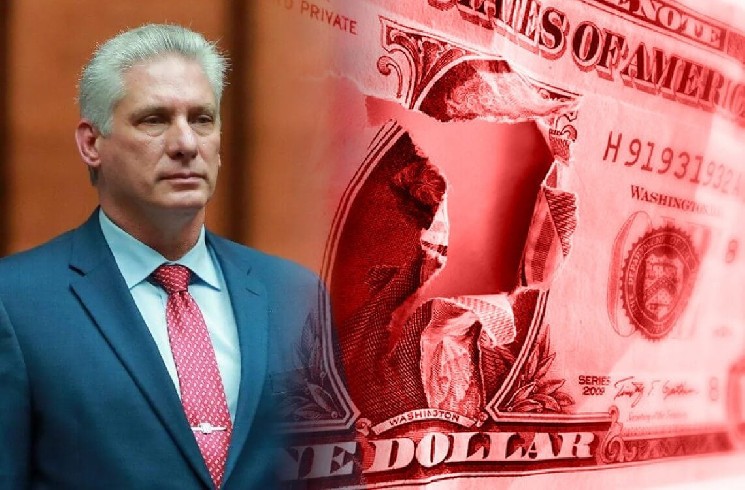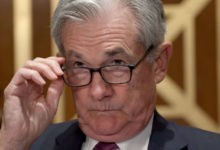Ditching USD is an escape from sanctions and aggression

- Diaz-Canel critiques USD dominance in global trade, citing repressive effects.
- BRICS nations push for de-dollarization, considering a shared currency.
- Countries globally seek to reduce USD reliance, pointing towards a shift in world economic order.
The quiet murmurs of the world’s economic machinery have become increasingly resonant as nations grapple with the domineering influence of the United States dollar (USD).
In an exclusive interview aired by RT, Miguel Diaz-Canel, Cuba’s President, made a bold statement emphasizing the repressive power of the USD, and what nations are doing to break free.
The USD’s global reach and its repercussions
Cuba’s top authority detailed how the ubiquity of the USD as a global reserve currency permits the United States to exert influence, which some interpret as a form of monetary hegemony.
According to Diaz-Canel, such a position enables the US to engage in activities that include implementing stringent sanctions, blackmailing, and fostering aggression.
The President didn’t shy away from expressing his views on the matter, highlighting how these actions often affect developing economies that struggle to fight back.
This isn’t the first instance where a leader has critiqued the USD’s dominating role in global trade. The call for de-dollarization has been a recurring theme among various nations that’ve been on the receiving end of US sanctions.
The rise of BRICS and the de-dollarization wave
An alternative to this situation may well be in the making. Diaz-Canel’s gaze turns towards the BRICS bloc, comprising Brazil, Russia, India, China, and South Africa.
The group represents an encouraging prospect for economic integration, primarily for developing economies looking to sidestep the looming shadow of the USD.
These countries are actively striving to reduce their reliance on the USD, proposing the use of their own currencies for settling trades. The move, which is expected to be a significant discussion point at their August summit, indicates a clear and conscious shift away from USD dependency.
The potential introduction of a shared BRICS currency could diminish the USD’s influence, and a successfully executed plan would inevitably reshape the world economic order.
Cuba, though not a BRICS member, enjoys a sturdy alliance with Russia, a relationship that traces back to the Soviet era. Trade interactions between the two nations have shown a substantial increase, reaching a staggering $452 million last year, a significant leap from its preceding value.
The effects of US sanctions and the road ahead
Cuba’s economic landscape has been largely shaped by US sanctions, initially enacted in the 1960s. The US justification for these sanctions ranges from human rights violations to the assertion of communist ideologies and regional instability.
In this context, Diaz-Canel lauded Russia’s role in promoting a multipolar world, which fosters more equitable trade relations and benefits nations that resist the “unfulfilled promises” of the United States.
Russian President Vladimir Putin echoed a similar sentiment, emphasizing that resistance to multipolarity would be detrimental.
The call to abandon the USD isn’t restricted to BRICS nations or their allies. Members of the Association of Southeast Asian Nations (ASEAN) have agreed to foster the use of their national currencies.
Similarly, representatives from nine Asian countries convened in Iran to explore potential de-dollarization strategies.
The rising tide of de-dollarization implies a significant shift in the global financial landscape. While the full impact remains to be seen, nations are no longer willing to remain passive under the influence of the USD.
They’re actively seeking alternatives, a clear indication that a transformative epoch in international trade is on the horizon.
Disclaimer: The information provided is not trading advice. Cryptopolitan.com holds no liability for any investments made based on the information provided on this page. We strongly recommend independent research and/or consultation with a qualified professional before making any investment decision.






 Bitcoin
Bitcoin  Ethereum
Ethereum  Tether
Tether  USDC
USDC  TRON
TRON  Dogecoin
Dogecoin  Cardano
Cardano  Bitcoin Cash
Bitcoin Cash  Chainlink
Chainlink  Zcash
Zcash  Monero
Monero  LEO Token
LEO Token  Stellar
Stellar  Litecoin
Litecoin  Hedera
Hedera  Dai
Dai  Cronos
Cronos  Tether Gold
Tether Gold  OKB
OKB  Ethereum Classic
Ethereum Classic  KuCoin
KuCoin  Gate
Gate  Algorand
Algorand  Cosmos Hub
Cosmos Hub  VeChain
VeChain  Dash
Dash  Tezos
Tezos  TrueUSD
TrueUSD  Stacks
Stacks  IOTA
IOTA  Decred
Decred  Basic Attention
Basic Attention  Theta Network
Theta Network  NEO
NEO  Synthetix
Synthetix  Qtum
Qtum  Ravencoin
Ravencoin  DigiByte
DigiByte  0x Protocol
0x Protocol  Nano
Nano  Zilliqa
Zilliqa  Siacoin
Siacoin  Numeraire
Numeraire  Waves
Waves  Ontology
Ontology  Status
Status  BUSD
BUSD  Enjin Coin
Enjin Coin  Pax Dollar
Pax Dollar  Hive
Hive  Lisk
Lisk  Steem
Steem  Huobi
Huobi  OMG Network
OMG Network  NEM
NEM  Bitcoin Gold
Bitcoin Gold  Augur
Augur  HUSD
HUSD